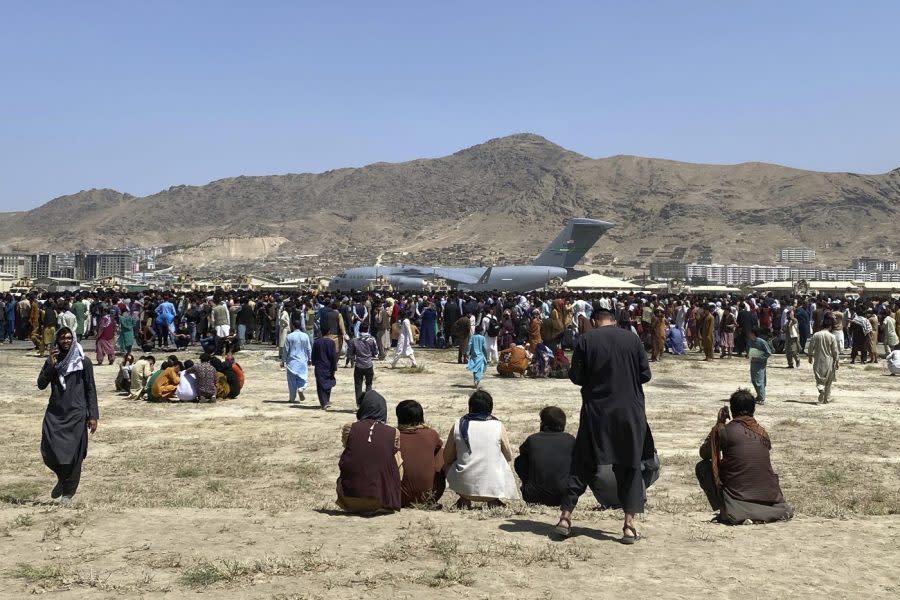Biden was engrossed in Kabul evacuation amid chaotic US withdrawal: book

- Oops!Something went wrong.Please try again later.
- Oops!Something went wrong.Please try again later.
- Oops!Something went wrong.Please try again later.
- Oops!Something went wrong.Please try again later.
President Biden was personally involved in solving problems at the Kabul airport during the chaotic U.S. withdrawal from Afghanistan, directing people on the ground to find ways to get Afghans at risk out of the country, according to an upcoming book.
The first excerpt of Atlantic staff writer Franklin Foer’s “The Last Politician: Inside Joe Biden’s White House and the Struggle for America’s Future” was released Tuesday. The excerpt, “The Final Days: Joe Biden was determined to get out of Afghanistan—no matter the cost,” recalls the U.S. troop withdrawal in August 2021.
The book’s release comes as the country marks the 2-year anniversary of the chaotic withdrawal, one of Biden’s first major foreign policy moves as president. House Republicans have been investigating the withdrawal, which they dubbed “disastrous.”
Foer wrote that as the U.S. pushed to evacuate Americans and others in Kabul, “Biden would pepper” former Ambassador to Afghanistan John Bass “with ideas for squeezing more evacuees through the gates.” Bass was called on by the State Department to lead the evacuation effort in Kabul.
“The president’s instinct was to throw himself into the intricacies of troubleshooting. Why don’t we have them meeting in parking lots? Can’t we leave the airport and pick them up?” Foer wrote.
The book also recalls that Biden himself and national security adviser Jake Sullivan were flooded with requests from Americans to help certain people in Afghanistan, with some claiming that if Sullivan didn’t do anything, their deaths would be on his hands.
“Throughout late August, the president himself was fielding requests to help stranded Afghans, from friends and members of Congress. Biden became invested in individual cases. Three buses of women at the Kabul Serena Hotel kept running into logistical obstacles,” Foer wrote. “He told Sullivan, ‘I want to know what happens to them. I want to know when they make it to the airport.’”
“When the president heard these stories, he would become engrossed in solving the practical challenge of getting people to the airport, mapping routes through the city,” Foer wrote.
After the hectic images out of the airport surfaced, Biden told the situation room to fill planes with evacuees and especially focus on what the administration deemed “Afghans at risk,” including reporters, teachers and the girls robotics team that would all be targets under the Taliban, the book details.
Foer wrote that “in the caricature version of Joe Biden that had persisted for decades, he was highly sensitive to shifts in opinion” but that the “criticism of the withdrawal caused him to justify the chaos as the inevitable consequence of a difficult decision.”
“So much of the commentary felt overheated to him. He said to an aide: Either the press is losing its mind, or I am,” he wrote of Biden.
After the remains of troops were sent to Dover Air Force Base, when Biden was told to “burn in hell” by a family member of one of the 13 fallen service members in Kabul, the president reportedly asked then-White House press secretary Jen Psaki if he should have handled everything differently.
The book described that Biden was exhibiting “determination, even stubbornness” despite the criticism over the withdrawal and that he “could be detached, even icy, when confronted with the prospect of human suffering.” It outlined Biden’s background on the Senate Foreign Relations Committee, but also as typically the empathic politician.
“Scranton Joe’s deep reserves of compassion were directed at people with whom he felt a connection; his visceral ties were with American soldiers. When he thought about the military’s rank and file, he couldn’t help but project an image of his own late son, Beau,” Foer wrote.
In the lead up to the withdrawal, the White House had “plans for catastrophic scenarios, which had been practices in tabletop simulations,” according to Foer, “but no one anticipated that they would be needed.”
The Biden team thought the Afghan military could hold off the Taliban for months and there was a “strongly held belief” inside the State Department that the embassy in Kabul would remain open after Aug. 31, 2021 and not have as robust a staff, but include some aid programs, according to Foer.
On Aug. 14 that year, the book recalls Blinken calling then-president of Afghanistan Ashraf Ghani about what might happen if the Taliban invaded Kabul before the end of that month. Ghani told Blinken, “I’d rather die than surrender.”
But, when Sullivan relayed the news to Biden that Ghani had in fact fled the country, Biden “exploded in frustration: Give me a break.”
The book recalls that just before the withdrawal, the White House was emptying out for summer vacations, which are typical in August. Foer wrote that at the time, there was talk of Secretary of State Antony Blinken flying to Doha, Qatar, to preside over the signing of an accord that would “wheedle the two warring sides” in Afghanistan into an agreement that included the Taliban.
Instead, Foer writes, “Biden’s inner circle could see that the legacy of the month would stalk them into the next election— and perhaps into their obituaries.”
Foer’s book is an insider account of Biden’s first two years in office and is set to release in a week. It is made up of almost 300 interviews between November 2020 and February 2023, according to Politico.
For the latest news, weather, sports, and streaming video, head to The Hill.

